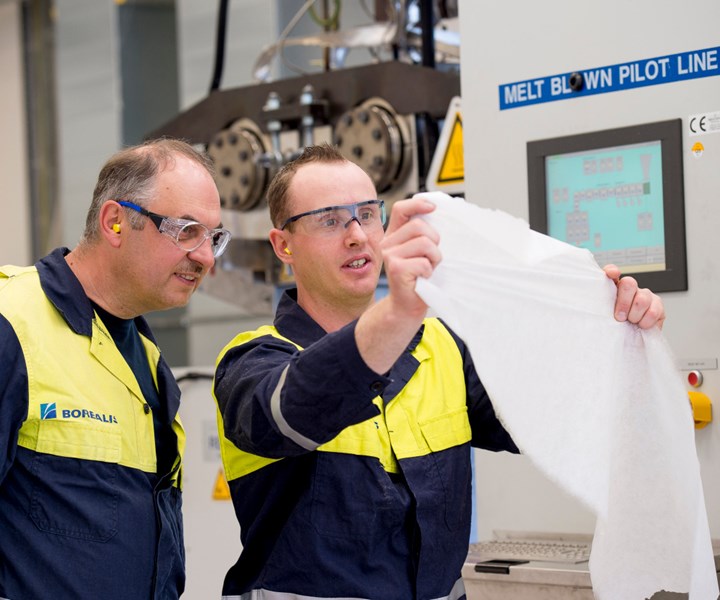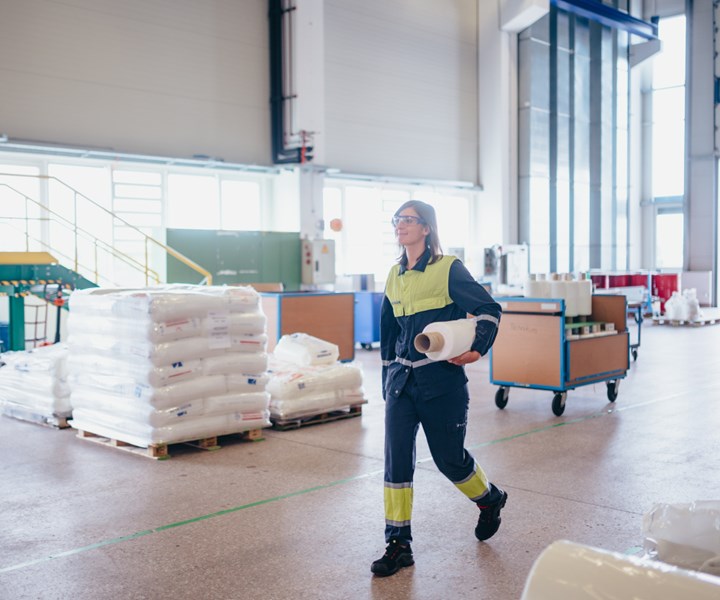Borealis Steps Up in Austrian Face Mask Initiative in the Coronavirus Crisis by Producing Meltblown Fabrics on Unique Pilot Line
Borealis’ new proprietary PP meltblown resin has boosted filtration properties due to its capability for finer fibers.
While they are part of our daily lives, the broad variety of PP based meltblown fabrics might not be visible to most of us. Such advanced PP solutions for meltblown fabrics are used not only in household appliances (e.g. vacuum cleaners), but also air cooling and heating devices. Their crucial importance for the hygiene and healthcare industries—in particular for face masks and protective wear—has been made painfully apparent as the global coronavirus pandemic has led to dramatic global shortages of essential personal protective equipment (PPE) for healthcare workers and others.
A typical mask is made out of spunbonded outer layers and a meltblown middle layer. The spunbonded layers provide the structure

Borealis’ Linz face mask production meltblown machine.
while the meltblown layer is providing the barrier properties. For high-end FFP1 to FFP3 masks, more advanced meltblown structures with extremely fine fibers are essential. Austria’s Borealis, which holds a 35-year track record in PP meltblown innovations and grades, offers both the unique meltblown materials and a variety of spunbond PP grades.
Now the company has started production of meltblown fabrics for face mask applications on its unique pilot line in Linz, Austria. Borealis managed to quickly convert the way of working from pure development to smaller scale pilot production to regularly produce rolls of fine fiber fabrics for face masks. Moreover, Borealis recently developed a proprietary PP meltblown resin that reportedly has boosted filtration properties due to its capability for finer fibers.

Roll of filtration fibers produced on the meltblown pilot line in the Borealis Innovation Headquarter in Linz.
By teaming up with value chain partners, local and regional governmental organizations and non-governmental organizations (NGOs), Borealis shows its dedication to enhance health and safety of communities in which it does business. This is done by supplying filtration fabrics for face masks in order to quickly respond to an urgent need in the region. The temporarily converted small-scale pilot testing facilities are located in the Application Hall at Borealis Innovation Headquarters in Linz. The newly developed Borealis PP, HL912FB, is being used to produce meltblown fabric to be applied for customized inlays in cotton-based mouth-nose masks, for conventional mouth-nose masks, and also for high-end face masks worn by medical professionals (FFP1 to FFP3).

HL912FB can be processed at higher processing temperatures allowing the production of even finer fibers. According to in-house testing, the use of Borealis HL912FB results in a significant improvement in filtration efficiency. The well-known Borealis meltblown resins HL708FB and HL712FB are reference grades for filtration, and are also manufactured at Borealis facilities in Europe and made available to customers worldwide.
Related Content
-
Prices for PE, PS, PVC, PET Trending Flat; PP to Drop
Despite price increase nominations going into second quarter, it appeared there was potential for generally flat pricing with the exception of a major downward correction for PP.
-
Prices Up for PE, PP, PS, Flat for PVC, PET
Trajectory is generally flat-to-down for all commodity resins.
-
Commodity Resin Prices Flat to Lower
Major price correction looms for PP, and lower prices are projected for PE, PS, PVC and PET.
















